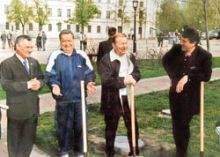“Ukraine must choose a correct long-term strategy of development. Many of our problems emerged because, instead of marching towards the 21st-century-type postindustrial society, we took the path of primitive accumulation, i.e., the so-called ‘wild capitalism’.” These words from Viktor Yanukovych’s inauguration speech drew special attention of The Day journalists – also because we have written very much about the period of total accumulation of capital by a limited number of individuals, about flouting any rules of the game on the Ukrainian market, and about those who set this ball rolling. Tellingly, immediately after the election runoff results became clear, Leonid Kuchma (who, incidentally, sat in a Verkhovna Rada box last Thursday but did not look very optimistic) said that his people were making a comeback – perhaps in a hope that “his people” have not forgotten in the past five years who actually distributed resources when they were enriching themselves and assuming topmost administrative offices. It is therefore sort of a pleasant sensation that Yanukovych should have called “wild capitalism” a wrong path for Ukraine. If you add to this Rinat Akhmetov’s words that “our goal is to overcome corruption,” thus creating a favorable investment climate, which he told The Day on the election night, this really presents a sight for voters’ sore eyes: the Party of Regions has decided (in their own or national interests?) to turn Ukraine around and lead it to the next stage of socioeconomic relations. This is the result of difficult and, above all, psychological work. Is the new government able to learn the following “commandment:” “Share out what you have and moderate the appetites of those like you?” The Day’s expert is not too optimistic about this matter.
Kostiantyn MATVIENKO, expert, Gardarica Corporation of Strategic Consulting:
“The term ‘wild capitalism’ probably means in this case the share of a shadow economy in the overall economic and industrial process, politico-economic clans being one of the subjects of a shadow economy. An election campaign is predominantly based on illegal economic relations, from non-formal payment for publicity, spin masters, canvassers, and electoral commission members, to placing an order for all kinds of products on foreign consultants. Therefore, ‘wild capitalism’ is an integral part of the Ukrainian political landscape. Naturally, Yushchenko,
Tymoshenko, and Yanukovych depend to a large extent on the shadow economy and, hence, on what you call ‘wild capitalism.’ It is psychologically very difficult to fight against oneself. I do not think that what was said in the inauguration speech meant combating ‘wild capitalism’ as a negative systemic phenomenon. In all probability, this encodes the message ‘To friends everything, to enemies the law.’ In other words, those ‘wild capitalists’ who will not come to bow to Yanukovych will be neutralized in some way and the others will continue to act the same system in which they have been acting up to now.
“The trouble is that ‘wild capitalism’ is incapable of developing and establishing an infrastructure. In other words, ‘wild capitalism’ does not build bridges. It is dangerous in that it will obviously destroy the remnants of the infrastructure inherited from the Soviet era. The coming of Yanukovych to power will not eliminate this danger. Yet the latter will not increase either because the Tymoshenko era cannot be characterized, too, as assumption of the civilized rules of the game. It is, naturally, a negative fact because standing idle at the stage of ‘wild capitalism’ does not provide an impulse for this country’s development.”
This topic, which the newly-elected president outlined, needs to be further dwelt upon. We therefore invite our contributors and readers to discuss the problems of overcoming ‘wild capitalism’ in Ukraine.







